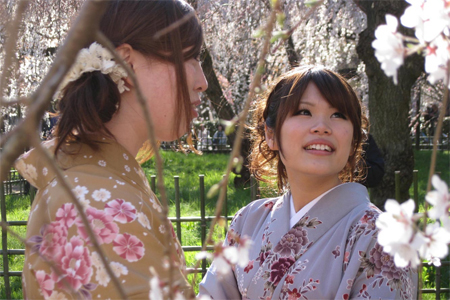

March 11 marked the one-year anniversary of the tsunami and earthquake in Japan. To raise awareness about the disaster, React to Film and the Communication and Media Society are showing “The Tsunami and the Cherry Blossom” on Thursday, March 15 in Lecture Center (LC) 108.
According to the Communication and Media Society, “Tsunami and the Cherry Blossom” will be shown throughout March on more than two-dozen campuses throughout the United States in honor of the relief efforts.
The film by Lucy Walker was nominated for an Academy award and won the 2012 jury prize in short filmmaking from the Sundance Film Festival.
Walker said she was already planning to be in Japan for a press junket when she started making this short documentary. Originally the story started out as a five-minute visual haiku but she said the story was so poignant and the symbol of cherry blossoms always resonated with her.
In Japan, cherry blossoms symbolize the beginning of spring and the end of winter or the end a difficult period and the beginning of prosperity.
The documentary features how the survivors of the tsunami in Japan find the courage to rebuild in the aftermath of the earthquake and tsunami as the cherry blossom season approaches, Walker said.
Japanese-born Aki Mizutani, editor of the film, said she arrived in Japan shortly after the tsunami hit and witnessed most of the initial devastation and disarray first hand. She said she worked on this film to show the strength her country was displaying.
Communications and Media Society member Lindsay Nimphius said showing this film brings awareness to the efforts Japan is making.
“It is very important to take time out every once and a while to realize there are things out there that are bigger than you,” Nimphius said. “With an organization such as this, you become aware of issues such as the destruction left after the tsunami and we encourage you to do more.”
At the screening, all College Action Networks will have a “text to donate” number. This will give viewers a way to help those in need, Nimphius said. Audience members will also be told to “like” React to Film on Facebook and the organization will donate money to the relief effort. All money will be going to BEYOND Tomorrow: Great East Japan Earthquake Reconstruction Assistance Project.
The program aims to alleviate the destruction caused by the recent disasters by helping those who lost everything. BEYOND Tomorrow offers scholarships for men and women to attend prestigious universities in Japan and abroad.
“We established BEYOND Tomorrow to support the young victims who, despite facing great adversity, did not lose hope and continued to embrace a dream to give back to society in the future,” Global Fund for Education Assistance Executive Director Minami Tsubouchi said.
The Communications and Media Society will hold another React to Film screening toward the end of the semester. They will be showing “Living for 32” on April 16 at 8 p.m. in LC 104.
